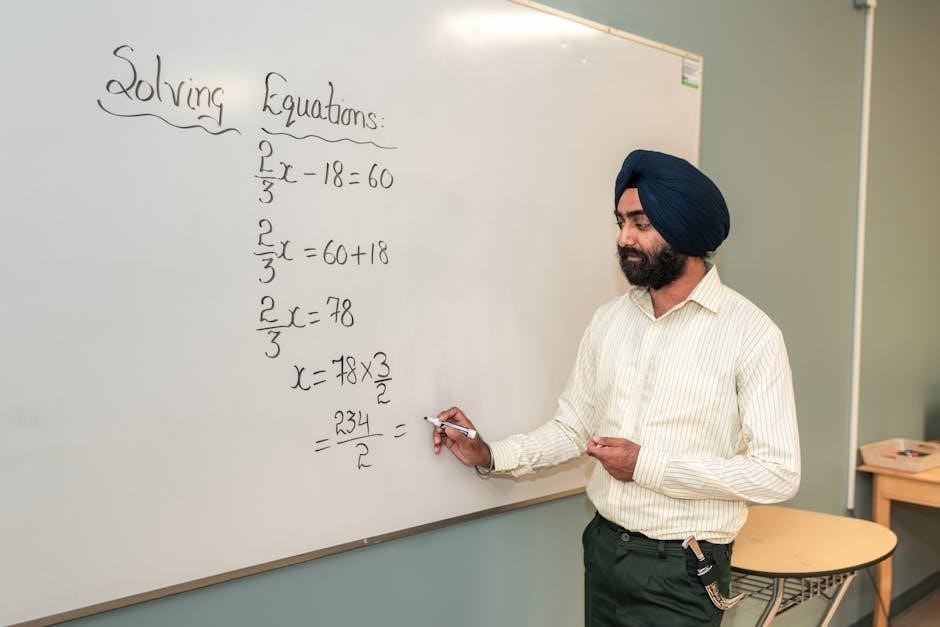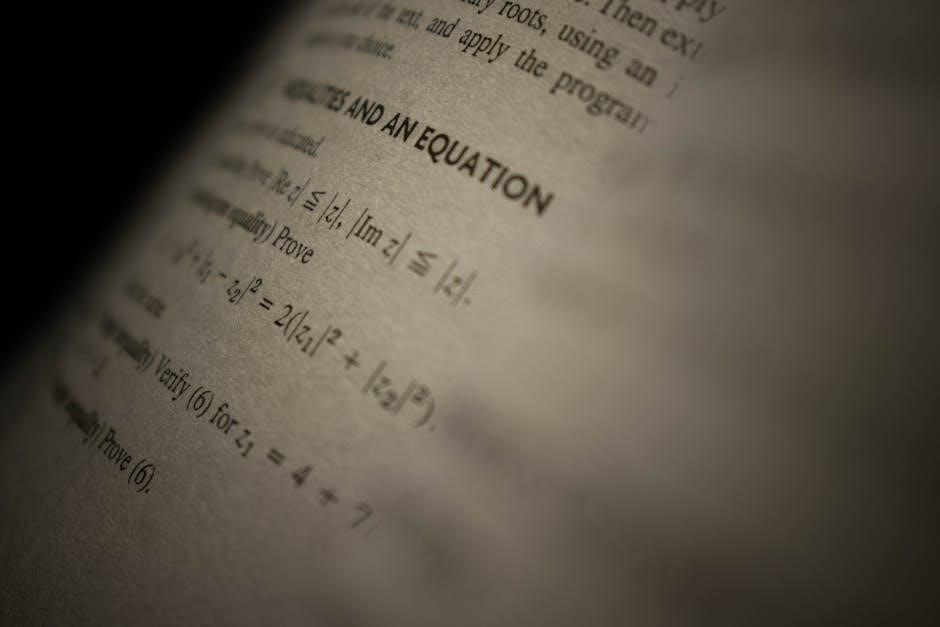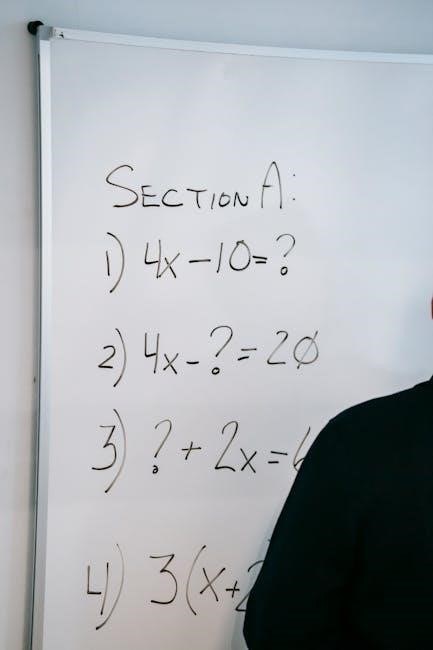The 1000 Mathematical Olympiad Problems PDF offers a comprehensive collection of challenges from national and international competitions, organized to aid students and teachers in mastering advanced problem-solving strategies effectively.
Overview of the Resource
The 1000 Mathematical Olympiad Problems PDF is a comprehensive resource containing over 1000 challenges from various national and international competitions held between 1986-1996. Divided into four sections, it covers problems from the Indian National Olympiad, national olympiads of over 40 countries, the International Mathematical Olympiad (IMO), and the International Tournament of Towns (ITT). Each problem is categorized by cognitive levels, ranging from Level 2 to Level 10, and specifies the mathematical areas tested, such as number theory, algebra, and geometry. Designed for both self-study and teacher-led training, the PDF provides detailed solutions, making it an invaluable tool for students and educators preparing for advanced mathematical competitions.
Structure and Organization
The 1000 Mathematical Olympiad Problems PDF is meticulously organized into four distinct sections, each focusing on problems from specific competitions. The first section highlights challenges from the Indian National Olympiad, while the second features problems from over 40 countries’ national olympiads. The third section is dedicated to the prestigious International Mathematical Olympiad (IMO), and the fourth showcases the creative and engaging problems from the International Tournament of Towns (ITT). Within each section, problems are categorized by cognitive levels, ranging from Level 2 to Level 10, and specify the mathematical areas tested, such as number theory, algebra, or geometry. This logical arrangement ensures easy navigation and focused study, making it an ideal resource for both self-study and teacher-led training.
Target Audience and Benefits
The 1000 Mathematical Olympiad Problems PDF is primarily designed for high school students preparing for national and international math competitions, as well as advanced problem-solving enthusiasts. It also serves as a valuable resource for teachers seeking to train students in tackling non-routine mathematical challenges. The benefits include exposure to a wide variety of problems, detailed solutions, and a structured approach to learning. Students can enhance their problem-solving skills, logical reasoning, and mathematical creativity. Additionally, the resource helps bridge gaps in understanding complex concepts by providing clear explanations and step-by-step solutions. It is ideal for self-study or classroom use, catering to diverse learning needs and fostering a deeper appreciation for mathematics.

National Mathematical Olympiad Problems
International Mathematical Competitions
International Mathematical Olympiad (IMO) Problems
The PDF includes a curated selection of IMO problems from 1986 to 1996, covering diverse mathematical topics and challenging difficulty levels to enhance problem-solving skills and logical reasoning.
Problems from the Indian National Olympiad
The 1000 Mathematical Olympiad Problems PDF includes a diverse range of challenges from the Indian National Olympiad, covering various mathematical topics such as number theory, algebra, and geometry. These problems are designed to test logical reasoning, problem-solving skills, and creative thinking. The Indian National Olympiad problems are known for their complexity and depth, often requiring innovative approaches. The PDF organizes these problems by cognitive levels, making it easier for students to progress systematically. This section is particularly beneficial for students preparing for national-level competitions, as it provides insights into the problem-solving strategies and techniques required to excel in mathematics. The inclusion of detailed solutions further enhances its value as a learning resource.
Problems from Olympiads of Over 40 Countries
The 1000 Mathematical Olympiad Problems PDF features an extensive collection of challenges from national olympiads of over 40 countries, showcasing diverse mathematical approaches and problem-solving techniques. These problems reflect the unique emphasis of each country’s educational system, offering students a global perspective on mathematics. From algebra and geometry to number theory, the problems are designed to stimulate critical thinking and creativity. The PDF categorizes these challenges by difficulty and topic, allowing learners to focus on specific areas of improvement. Detailed solutions are provided, making it an invaluable resource for self-study and competitive exam preparation. This global representation enriches the learning experience, exposing students to varied problem types and strategies.
The PDF includes problems from the International Mathematical Olympiad (IMO) and the International Tournament of Towns (ITT), offering diverse challenges that test global mathematical excellence and creativity.
The PDF features a curated selection of problems from the International Mathematical Olympiad (IMO), showcasing challenges from various years. These problems are renowned for their complexity and depth, covering topics such as Number Theory, Algebra, and Geometry. Designed to test advanced problem-solving skills, IMO problems are ideal for high school students preparing for Olympiad-level competitions. Each problem is categorized by cognitive levels, ranging from basic to highly advanced, ensuring a structured approach to learning. Detailed solutions are provided, making the resource invaluable for self-study and classroom training. The inclusion of IMO problems in the PDF offers students and educators a comprehensive tool to master high-level mathematical thinking and problem-solving techniques effectively.
International Tournament of Towns (ITT) Challenges
The PDF includes a diverse range of problems from the International Tournament of Towns (ITT), a prestigious competition known for its engaging and intellectually stimulating challenges. ITT problems are designed to encourage creative thinking and advanced problem-solving techniques, making them a valuable addition to the resource. These challenges cover various mathematical areas, including Number Theory, Algebra, and Geometry, and are categorized by difficulty levels to suit learners of different skill sets. The detailed solutions provided for each problem allow students to understand the thought process and methods required to tackle complex mathematical scenarios effectively. This makes the ITT section of the PDF an excellent tool for both self-study and structured learning environments.

Key Topics and Problem Types
The PDF covers essential mathematical areas such as Number Theory, Algebra, and Geometry, with problems categorized by difficulty and cognitive levels to enhance learning effectiveness.
Number Theory Problems
The PDF includes a wide array of Number Theory challenges, such as problems involving integers, divisibility, prime numbers, and modular arithmetic. These problems are designed to test logical reasoning, pattern recognition, and the ability to apply fundamental theorems. Many questions focus on finding the greatest common divisors (gcd), solving Diophantine equations, and exploring properties of sequences. The problems are graded by difficulty, ranging from basic to advanced, ensuring suitability for both novice and experienced participants. Detailed solutions are provided, enabling learners to understand and replicate problem-solving strategies. This section is invaluable for honing foundational mathematical skills and preparing for higher-level competitions. It emphasizes critical thinking and mathematical insight.
Algebra and Geometry Challenges
The 1000 Mathematical Olympiad Problems PDF includes a diverse range of Algebra and Geometry challenges designed to enhance problem-solving abilities. Algebra problems focus on equations, sequences, and functional relationships, while Geometry challenges involve proofs, spatial reasoning, and properties of shapes. These problems often require the application of algebraic manipulations, geometric theorems, and creative thinking. Detailed solutions are provided for each problem, allowing learners to understand and master various approaches. The content is structured to cater to different skill levels, from basic to advanced, ensuring comprehensive preparation for mathematical competitions. This section emphasizes logical reasoning, analytical skills, and the ability to apply mathematical concepts to real-world scenarios effectively.
Preparation and Study Tips
The PDF aids self-study and teacher-led training with categorized problems, cognitive levels, and detailed solutions, encouraging regular practice and focused improvement in key mathematical areas.
Using the PDF for Self-Study
The 1000 Mathematical Olympiad Problems PDF is an excellent resource for self-study, offering a structured approach to mastering mathematical problem-solving. Learners can progress systematically through problems categorized by difficulty and topic. Each problem is accompanied by detailed solutions, enabling students to identify gaps in their understanding and refine their techniques. The PDF’s organization by cognitive levels and mathematical areas allows for focused practice, ensuring a comprehensive grasp of key concepts. By dedicating time to regular practice and reviewing solutions, students can enhance their analytical skills and build confidence in tackling complex challenges independently. This resource is particularly beneficial for those preparing for Olympiad competitions or seeking to deepen their mathematical proficiency.
Teacher’s Guide to Training Students
The 1000 Mathematical Olympiad Problems PDF serves as a valuable tool for educators aiming to train students for competitive mathematics. Teachers can utilize the structured content to design tailored lesson plans, assigning problems based on cognitive levels and specific mathematical areas. The detailed solutions provided in the PDF enable instructors to create model examples and guide students through complex concepts. By incorporating these problems into classroom activities, teachers can foster critical thinking and problem-solving skills. The resource is particularly useful for identifying and addressing individual learning gaps, ensuring students are well-prepared for national and international mathematical competitions. It also supports collaborative learning environments, where students can engage in group problem-solving exercises under teacher supervision.

Advanced Problem-Solving Strategies
The PDF introduces advanced strategies like cognitive level grading and matching problems with mathematical tools, helping students refine their approach to complex Olympiad challenges effectively.
Cognitive Levels and Difficulty Grading
The 1000 Mathematical Olympiad Problems PDF categorizes challenges based on cognitive levels, ranging from Level 2 to Level 10, reflecting increasing complexity and depth. This grading system helps learners identify problems aligned with their skill development, ensuring a progressive learning experience. Each problem is tagged with its cognitive level and the mathematical areas it tests, such as number theory, algebra, or geometry. This structured approach allows students to focus on specific skills and gradually tackle more advanced topics. The PDF also emphasizes matching problems with appropriate mathematical tools, guiding learners to apply relevant concepts effectively. This methodology enhances problem-solving efficiency and prepares students for high-level competitions.
Matching Problems with Mathematical Tools
The 1000 Mathematical Olympiad Problems PDF guides learners to connect problems with specific mathematical tools and techniques, fostering a strategic approach to problem-solving. By identifying the cognitive level and relevant areas each problem targets, students can select appropriate methods from their mathematical toolkit. For instance, number theory problems may require modular arithmetic or divisibility concepts, while algebra challenges might demand equation manipulation or inequality techniques. This alignment ensures that learners apply the most effective strategies, enhancing both understanding and solution accuracy. The PDF emphasizes this matching process to help students refine their skills and tackle complex problems with confidence and precision, preparing them for the rigors of international competitions.

Additional Resources and Tools
Supplement your study with recommended websites, online forums, and math clubs. Experienced mentors and detailed problem solutions further enhance your mastery of mathematical Olympiad challenges effectively.
Recommended Websites and Forums
Enhance your preparation with platforms like Brilliant.org, Art of Problem Solving (AoPS), and Mathematics Stack Exchange. These websites offer a wealth of resources, including practice problems, discussion forums, and detailed solutions. Additionally, the official IMO website provides archives of past problems, while Project Euler and Expii cater to advanced problem-solving challenges. Online forums like Reddit’s r/math and Mathematics Forum connect you with a global community of math enthusiasts and experts. These tools complement the PDF, offering diverse perspectives and fostering collaborative learning. Leverage these resources to refine your skills and explore innovative approaches to mathematical problem-solving.
Role of Mentors and Math Clubs
Mentors and math clubs play a crucial role in complementing the 1000 Mathematical Olympiad Problems PDF. Experienced mentors provide personalized guidance, helping students navigate complex problems and refine their problem-solving techniques. Math clubs offer a collaborative environment where students can discuss challenges, share insights, and learn from one another. These platforms foster creativity and resilience, essential for excelling in Olympiad-level mathematics. Mentors often introduce advanced strategies and encourage critical thinking, while clubs promote peer-to-peer learning and healthy competition. Together, they create a supportive ecosystem that enhances the effectiveness of the PDF as a study resource, helping students achieve their full potential in mathematical competitions.
